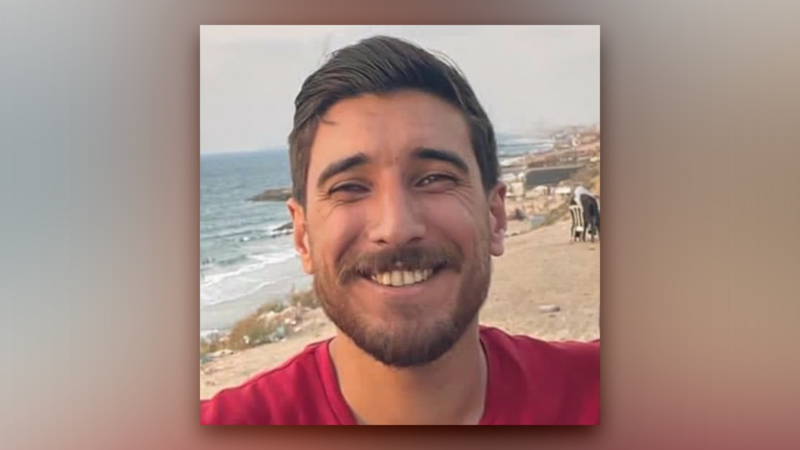The Electronic Intifada 3 June 2024

Ahmad’s body was found during the brief November truce.
Ahmad had almond eyes and blond hair.
He was opinionated, ambitious and kindhearted. He loved books and music.
Ahmad – my father’s cousin – and his family had experienced an enormous amount of grief.
One of his brothers was killed during Operation Cast Lead – Israel’s attack on Gaza in late 2008 and 2009.
Around the same time, one of Ahmad’s sisters died from an illness.
In 2020, Ahmad’s father had a severe headache while working. His father tried to keep going until one day he lost consciousness.
Ahmad’s father was diagnosed with a brain tumor. The cancer was at an advanced stage when it was detected.
Some members of the family brought his father abroad for treatment. About two years after he received treatment, his father collapsed again and died.
With his father dead and his older brother married, the family became dependent on Ahmad.
Ahmad and his family lived in al-Mukhabarat, an area northwest of Gaza City.
In the early stages of the current war on Gaza, Israel ordered the family to leave their home. Soon after the family left, Israel bombarded the neighborhood.
The family went to stay with relatives in Beit Lahiya, northern Gaza.
On 22 November, Ahmad left the house where the family were taking shelter in the morning. His mother grew increasingly anxious as that day went on, without Ahmad returning.
Two days passed and still there was no news from him.
Thunderbolt
On 24 November, a truce was called. It turned out to be very brief but at the time we hoped it would be extended indefinitely.
My own family went back to our home, began cleaning it and preparing food. We felt happy for a while.
And then the news of Ahmad’s martyrdom struck us like a thunderbolt.
Ahmad was found lying on the ground. He had been struck by shrapnel in his neck.
It appears that he bled to death, without anyone being around who could help him.
I could not believe the news when I heard Ahmad had been killed.
At first I froze in place. Then I started weeping bitter tears.
I cried for how a young man with dreams and ambitions had been taken away from us in such a cruel and criminal manner.
I cried for Ahmad’s mother. I cried for all the agony she had experienced.
One thing that eased my grief was knowing that Ahmad’s body was intact.
Here in Gaza, it has become a luxury to die with your body intact. I have seen the bodies of neighbors, burned so terribly that you could not recognize them.
People have been decapitated. Many bodies were in pieces when they were found.
I thank God that we were able to identify Ahmad and bury him in a place we know, not in a mass grave.
More horrible news
The truce came to an end after a week.
On the day that the war resumed our home was targeted. Miraculously, we managed to flee it.
We went to stay with our relatives – who had already provided us with shelter – once again.
While there, we got more horrible news. Ahmad’s older brother was killed during a massacre that Israel carried out in Beit Lahiya.
How could this happen?
How could their mother cope with losing two sons within such a short timeframe?
The situation got worse in northern Gaza. After Israeli troops invaded the area where we were staying, we took shelter in Gaza City.
By coincidence, we were evacuated along with Ahmad’s mother and her remaining daughter and son.
In the shelter, approximately 20 of us had to sleep in one room.
I woke up at night needing to use the bathroom. I saw Ahmad’s mother sitting near the door.
I asked her why she was not sleeping. She replied that she was waiting for Ahmad to return.
My tears fell uncontrollably.
“You think I am crazy,” his mother said.
She explained that even though she had seen Ahmad’s dead body, “my heart feels that he is still alive.”
Ahmad’s younger sister was injured during the Beit Lahiya massacre. The massacre in which their brother was killed.
His sister told me that she and Ahmad used to quarrel. After a quarrel, Ahmad would bring her gifts and her favorite food, trying to cheer her up.
Ahmad had bought an apartment, she said, as he wanted to get married.
He had begun furnishing it. But the job had not been completed and now it never would be.
Ahmad’s little brother is only 8.
“I miss Ahmad,” he told me. “I want to grow up and get married and have many children, so that I can name them after my brothers who were all martyred.”
Ahmad’s mother told me that on the day they had to leave al-Mukhabarat, Ahmad helped some older neighbors, one of whom had restricted mobility. Ahmad managed to get out of the building where they lived just before Israel attacked it as he went to help his neighbors evacuate.
Ahmad deserved to live. Israel robbed him of that possibility.
Rest in peace, Ahmad.
Asil Almanssi is a writer based in Gaza.





